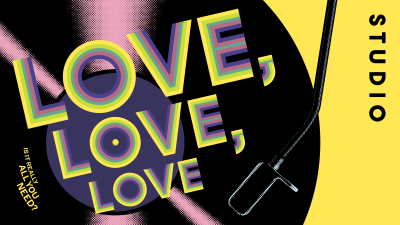IS LOVE REALLY ALL YOU NEED?
“Love” appears three times in the title of this three-act play, and there are three separate time periods and settings, all of which are directed with solid, assured focus by David Muse, impressively in his 14th year as Studio Theatre Artistic Director. Written by the prolific British playwright Mike Bartlett — best-known on this side of the Pond for King Charles III (Broadway 2015) and Cock (another successful production for Studio Theater in 2014 and 2021) — the 2010 Love, Love, Love premiered in NY in a 2016 Off-Broadway production by Roundabout.
Hunter Hoffman and Max Gordon Moore.
Only two of the actors appear in all three acts — Max Gordon Moore as Kenneth, and Liza J. Bennett as Sandra; astonishingly enough, their characters cover 44 years. With the added expertise of costume designer Montana Levi Blanco, we’re given a snapshot of two full lives in a little over two hours. Act I begins in 1967 when the two 19-year-old baby boomers are ready to shake things up, rebel against their parents and the times, and pursue what feels true and right for them. As they dance, couple up, and dream of lifelong plans together, The Beatles perform their hit song “All You Need Is Love” on the telly.
Hunter Hoffman, Liza Bennett, and Max Gordon Moore.
For a play that mentions the word love as often as it does, it’s surprising how little love there is onstage — until (perhaps) the closing moments with a reunion and a reprise of the song. In between, we have a lot of conniving, cheating, and married couple games that rival George and Martha in Albee’s Who’s Afraid of Virginia Woolf? But Bartlett goes two steps further: in Act II, the married couple has two teenage children, and in Act III, the adult children either still live at home or expect hand-outs that they perceive are rightfully theirs (both teens and adults are played by Max Jackson as Jamie and Madeline Seidman as Rose).
Liza Bennett and Max Gordon Moore.
While Jackson’s deeply receding hairline rings true for Max in the third act but not in the second when he’s 14, acting wise, it’s impressive how well Jackson and Seidman pull off their teenage years, followed by 20 years later when neither of their lives have gone as planned.
Max Jackson, Max Gordon Moore, and Madeline Seidman.
The fifth actor of the cast is Hunter Hoffman who plays Kenneth’s brother, Henry. He only appears in the first act, but is so incredibly focused and honest in every single moment, I actually missed his presence in the ensuing acts.
Max Gordon Moore, Madeline Seidman, and Liza Bennett.
Alexander Woodward pulls his set design down to the lip of the stage, starting in a small claustrophobic flat. Note that as the baby boomers acquire money in each new act, the settings become bigger and more lavished, not missing a single detail from each new period (props by Amy Kellet). All the designers — Cha See, lights; Matthew M. Nielson, sound; Lisa Beley, dialect coach — successfully accomplish the 44-year journey.
Hunter Hoffman, Liza Bennett, and Max Gordon Moore.
What’s most interesting about Bartlett’s writing is how much I enjoyed watching his characters mature, how much I laughed at their wicked tongues (and Bartlett’s satire), but also how much I despised their selfishness and egos. Despite the large amount of cold dysfunction onstage, I enjoyed and hated them at the same time. No easy task, I’m sure. The boomers freely criticize their children, as do the Gen Xers toward their parents. The generational warfare gives the audience a lot to consider. From our point of view, neither of the generations are much admired or respected. In the end, I couldn’t help but think what a mess each generation has made of it. And when The Beatle’s song brings the evening to a close, for the first time in my life, the song sounded positively naïve.
photos by Margot Schulman
Love, Love, Love
Studio Theatre
Victor Shargai Stage, 1501 14th Street NW in Washington, DC
ends on February 18, 2024 EXTENDED to March 3, 2024
for tickets ($45-$140, plus discounts), visit Studio Theatre

